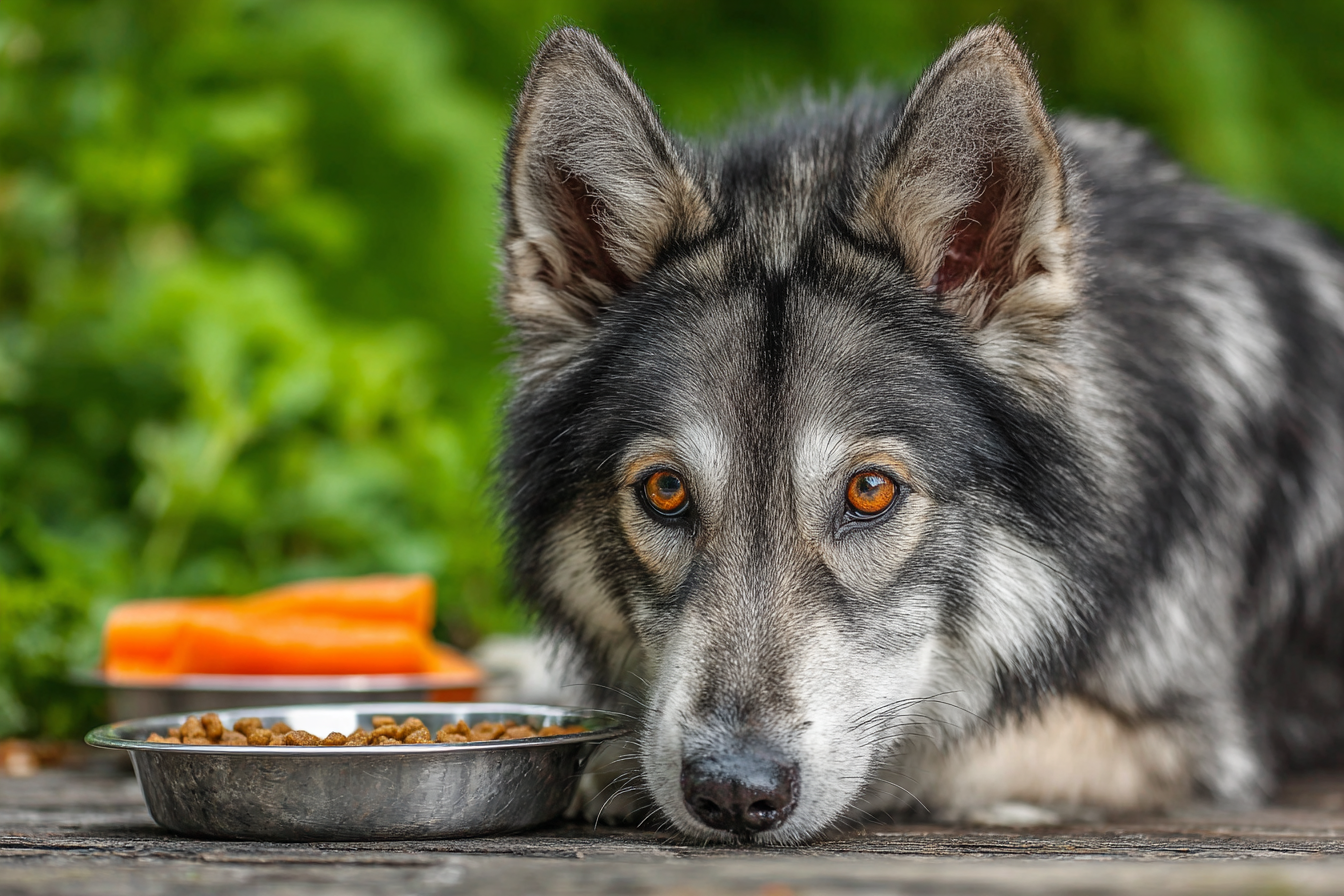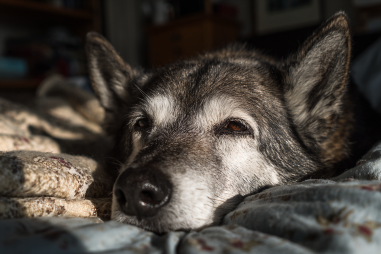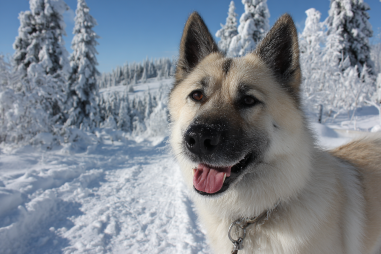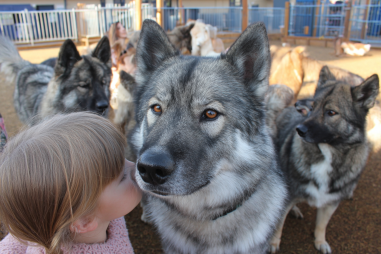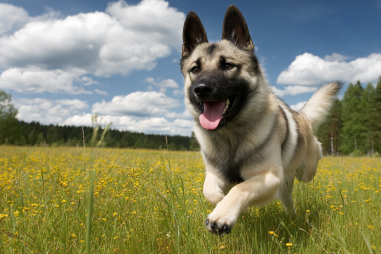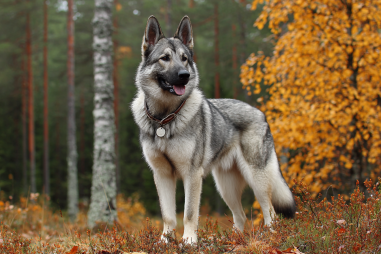Feeding your Norwegian Elkhound a well-balanced diet is essential for maintaining their energy, health, and overall wellbeing. This breed is known for its active lifestyle, robust physique, and thick coat, all of which require specific nutritional considerations. Tailoring their diet to meet their unique needs can help ensure they live a vibrant, happy life. In this article, we’ll explore the optimal diet recommendations to keep your Norwegian Elkhound thriving, from nutritional requirements to the types of foods and feeding schedules they benefit from.
Nutritional Requirements of Norwegian Elkhounds
Norwegian Elkhounds are medium-sized dogs with a strong build and a lively temperament. To support their activity level and maintain their dense double coat, they require a balanced mix of macronutrients and micronutrients. Their diet should include:
- Protein: High-quality protein is essential for muscle maintenance and repair. Look for dog foods that list meat, fish, or poultry as the primary ingredient. Elkhounds typically benefit from 18-25% protein in their diet, depending on their age and activity.
- Fat: Healthy fats provide energy and help keep their coat shiny and skin healthy. Around 8-15% fat content in their diet is suitable, with sources including fish oils and flaxseed oils, which are rich in omega-3 and omega-6 fatty acids.
- Carbohydrates: Complex carbohydrates such as sweet potatoes, brown rice, or barley provide a steady energy release throughout the day. These help fuel their active lifestyle without causing sudden energy spikes.
- Vitamins and minerals: Essential for immune function, bone health, and overall cellular processes. A balanced commercial dog food usually meets these needs, but fresh vegetables and fruits can also supplement these vitamins.
Because Norwegian Elkhounds can be prone to certain health issues such as hip dysplasia and obesity, providing the right balance of nutrients helps maintain their ideal weight and joint health.
Suitable Dog Food Types and Ingredients
Choosing the right type of dog food for your Norwegian Elkhound is crucial. You have several options depending on your preference, budget, and your dog’s particular sensitivities:
- Dry kibble: A convenient option that often contains all necessary nutrients. Look for kibble formulated for medium-sized, active breeds with high protein and moderate fat levels. Avoid those with fillers like corn, wheat, or soy.
- Wet food: These foods tend to be more palatable and hydrating but can be more expensive. Wet food can be mixed with kibble or used occasionally as a treat or meal topper.
- Raw or homemade diets: Many owners prefer preparing raw or homemade meals to control exactly what the dog consumes. If you decide on this path, consult with a veterinary nutritionist to ensure the diet is balanced and complete. Include lean meats, organ meats, bone (for calcium), and a variety of vegetables.
When reading ingredient labels, prioritize whole meats and named animal protein sources over generic meat by-products. Foods rich in omega fatty acids such as salmon or flaxseed will aid their coat and skin health.
Feeding Portion Guidelines by Age and Activity
The amount your Norwegian Elkhound eats depends largely on their age, weight, and activity level. Here are general guidelines to help you tailor portions appropriately:
- Puppies (up to 1 year): Growing Elkhounds have higher protein and calorie needs. Feed 3-4 times daily with meals that contain roughly 25-30% protein until they near adult size. Expect about 2-3 cups of quality puppy food per day, divided into multiple meals.
- Adults (1-7 years): Active adult Elkhounds typically require 1.5-2.5 cups of food per day, split into two meals. Adjust portions depending on their daily exercise; highly active dogs engaging in hiking or running regularly may need more calories.
- Seniors (7+ years): Older dogs may be less active and have slower metabolisms; slightly reduced calorie intake can prevent weight gain. Senior-specific diets that support joint health and contain antioxidants may also be beneficial.
It’s important to monitor their body condition regularly and adjust portions to avoid obesity, which can stress their joints and lead to other health complications.
Foods to Avoid
Certain human foods and additives can be harmful or even toxic to Norwegian Elkhounds. Avoid feeding them:
- Chocolate, caffeine, and alcohol: These contain substances toxic to dogs.
- Grapes and raisins: They can cause kidney failure.
- Onions, garlic, and chives: These can damage red blood cells and cause anemia.
- Xylitol-containing products: A sweetener found in sugar-free gum and candies that can cause severe insulin release and liver damage.
- Excessive fatty or salty foods: These can lead to pancreatitis or general digestive upset.
Additionally, avoid overfeeding treats and table scraps, which contribute empty calories and can disrupt balanced nutrient intake.
Hydration Tips
Proper hydration is key for your Norwegian Elkhound’s health, especially given their active nature. Always provide access to fresh, clean water throughout the day. Here are some helpful tips:
- Change the water at least once daily to keep it fresh and appealing.
- If your Elkhound spends time outdoors or exercises heavily, encourage them to drink water regularly during and after activity.
- Wet food can help increase water intake, especially for dogs who drink less water on their own.
Dehydration can affect energy levels, digestion, and kidney function, so keeping your Elkhound well-hydrated supports all-round health.
Supplements and Treats
While a complete and balanced diet should meet almost all nutritional needs, some supplements can provide extra support, particularly for joint health and skin condition:
- Glucosamine and chondroitin: Commonly recommended to maintain healthy joints and reduce arthritis symptoms, especially useful as your dog ages.
- Omega-3 fatty acids: Supplements like fish oil promote a glossy coat and may help with inflammation.
- Probiotics: Support digestive health and improve nutrient absorption.
Treats are also an important part of bonding and training but should be given sparingly. Opt for healthy options such as small pieces of cooked lean meat, carrots, or commercially available low-calorie dog treats. Limit treats to no more than 10% of your dog’s daily calorie intake.
Always consult your veterinarian before starting any new supplement to ensure it is appropriate for your Norwegian Elkhound’s specific health status and dietary requirements.
Feeding your Norwegian Elkhound according to their unique needs can really make a difference in their vitality and happiness. By focusing on high-quality proteins, balanced fats, and the right feeding amounts, you’ll support their active lifestyle and robust health. Remember to avoid harmful foods, encourage proper hydration, and consider supplements if needed. With thoughtful care and nutrition, your loyal Elkhound will enjoy a lifetime of energy, strength, and companionship.

